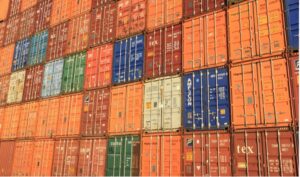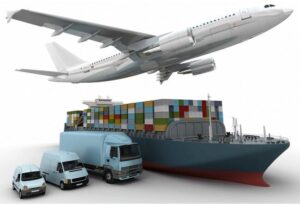Importing goods from China to France can be a lucrative business venture. However, navigating the intricacies of international shipping, particularly calculating shipping costs, can be a daunting task. This comprehensive guide delves into everything you need to know about shipping costs from China to France, empowering you to make informed decisions and optimize your supply chain.
Factors that Affect Shipping Costs from China to France

Numerous factors influence the final cost of shipping your goods from China to France. Understanding these variables is crucial for accurate cost estimation and budget allocation.
- Shipping Method: The chosen shipping method significantly impacts the cost. Ocean freight is the most economical option for bulk cargo, while air freight provides the fastest delivery but is pricier. Express delivery services offer premium speed at an even higher cost.
- Package Weight and Dimensions: Shipping costs are often calculated based on volumetric weight, which considers both the actual weight and the package’s dimensional weight (length x width x height). Optimizing packaging to minimize dead space can lead to significant cost savings.
- Origin and Destination Cities: The specific origin city in China and the destination city in France can affect the cost. Routes with higher demand or longer distances typically command higher freight rates.
- Fuel Surcharges: Fuel prices fluctuate, and shipping companies often implement fuel surcharges to offset these fluctuations. Be sure to factor in potential fuel surcharges when requesting quotes.
- Customs Duties and Taxes: Imported goods may be subject to customs duties and import taxes levied by French authorities. The specific rates depend on the type of goods and their value. Researching these fees beforehand is essential to avoid unexpected expenses upon arrival.
- Insurance: Cargo insurance is highly recommended to protect your shipment against loss or damage during transit. The cost of insurance varies depending on the declared value of your goods.
Understanding Shipping Methods and Their Costs

- Full Container Load (FCL): Ideal for large shipments that fill an entire container (20ft or 40ft). Offers the most cost-effective option per unit weight for bulk cargo.
- Less Than Container Load (LCL): Suitable for smaller shipments that don’t fill a full container. Goods are consolidated with other shipments in a shared container, resulting in a higher cost per unit weight compared to FCL.
Air Freight:
- The fastest shipping method, ideal for urgent deliveries or time-sensitive goods. Significantly more expensive than ocean freight.
Express Delivery Services:
- Premium services like FedEx or DHL offer the fastest delivery times but come at the highest cost per unit weight. Often used for critical shipments or high-value goods.
Additional Considerations:
- Inland Transportation: Costs associated with transporting goods within China to the port of origin and within France from the port of destination should be factored in.
- Delivery Duties: Incoterms (International Commercial Terms) clearly define who is responsible for costs like customs clearance and inland transportation at both origin and destination. Negotiating Incoterms with your supplier can significantly impact your landed costs.
Calculating Shipping Costs from China to France

Obtaining accurate shipping cost estimates is crucial for informed decision-making. Here are effective methods:
- Online Quote Calculators: Many freight forwarders offer online quote calculators that provide a starting point for estimated costs based on your shipment details (weight, dimensions, origin, destination).
- Requesting Quotes from Freight Forwarders: Contact reputable freight forwarders who specialize in China-France routes. Provide detailed information about your shipment to receive customized quotes.
Remember: When comparing quotes, ensure they include all applicable charges, including ocean freight, inland transportation, customs clearance fees, and potential fuel surcharges.
Strategies to Reduce Shipping Costs from China to France
Several strategies can help you optimize your shipping costs:
- Consolidate Shipments: Plan your purchases to consolidate multiple orders into fewer shipments. This can significantly reduce costs compared to frequent smaller shipments.
- Negotiate with Suppliers: Negotiate incoterms with your Chinese supplier to potentially shift responsibility for certain costs like inland transportation in China to them.
- Optimize Packaging: Reduce packaging weight and dimensions whenever possible to minimize volumetric weight calculations. Invest in space-saving packaging materials.
- Choose the Right Shipping Method: Carefully evaluate your needs. If speed is not a primary concern, ocean freight is the most cost-effective option for bulk cargo. Consider using air freight strategically for urgent shipments only.
Negotiating with Shipping Providers

Negotiating with freight forwarders can help you secure the most competitive rates. Here are some tips:
- Gather Multiple Quotes: Obtain quotes from several reputable freight forwarders specializing in China-France routes. Compare pricing structures, service offerings, and responsiveness to identify the best fit for your needs.
- Highlight Shipment Volume: If you anticipate frequent shipments, emphasize your potential volume to freight forwarders. High-volume shippers often have more bargaining power to negotiate favorable rates.
- Be Flexible with Scheduling: If your delivery deadlines are flexible, consider slightly extended transit times in exchange for potentially lower costs. Freight forwarders may offer lower rates for shipments that can be consolidated or routed on less time-sensitive vessels.
- Build a Strong Relationship: Develop a long-term partnership with a reliable freight forwarder. Consistent business with the same provider can lead to better rates and personalized service over time.
Tips for Packaging and Preparing Shipments for China-France Transit

Proper packaging is essential to ensure your goods arrive safely and avoid potential delays or damage-related costs. Here are key recommendations:
- Use High-Quality Materials: Invest in durable cardboard boxes, packing peanuts, void fill, and strapping to secure your goods during transport. Wooden crates may be necessary for fragile or heavy items.
- Pallet-ize When Necessary: For heavier or bulk shipments, palletizing your goods on wooden pallets creates a stable base for efficient loading and unloading with forklifts. Palletization can also minimize handling costs at ports and warehouses.
- Clear Labeling and Marking: Ensure all packages are clearly labeled with complete recipient information, including the consignee’s name, address, and contact details in both English and French. Mark packages with proper handling instructions like “fragile” or “this side up” if applicable.
- Comply with Customs Regulations: Research and adhere to all French customs regulations regarding labeling, marking, and documentation requirements for imported goods. Failure to comply can lead to delays and additional fees at customs.
Tracking and Managing Your Shipments from China to France
Real-time shipment tracking is crucial for maintaining control over your goods and ensuring timely delivery. Here’s how to effectively manage your shipments:
- Choose a Freight Forwarder with Tracking Tools: Select a freight forwarder that offers a user-friendly online tracking platform to monitor the location and status of your shipment in real-time.
- Communicate Effectively with Suppliers and Customers: Maintain clear communication with your Chinese supplier regarding shipment handover and documentation. Keep your customers informed about estimated delivery timeframes and provide tracking details once the shipment is on its way.
- Proactive Problem-Solving: Anticipate potential issues like customs delays or port congestion. Work collaboratively with your freight forwarder to develop contingency plans to minimize disruptions.
By following these comprehensive strategies, you can gain a clear understanding of shipping costs from China to France, optimize your supply chain, and navigate the complexities of international shipping with greater confidence. Remember, effective planning, cost-saving strategies, and a reliable freight forwarding partner are essential for ensuring a smooth and successful import experience.




